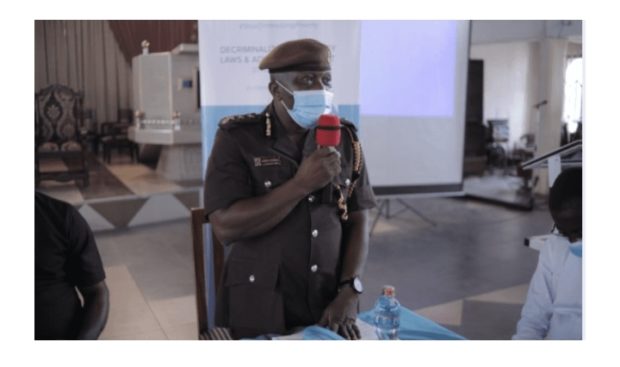The Deputy Director of Prisons and Officer-in-Charge of the Kumasi Central Prisons, Asamoah Fenning, who made the call said it is inhumane to keep petty offenders in deplorable walled prisons when these people can be used for developmental purposes rather than feeding them on peanuts.
He made these comments when a human-rights based NGO, Crime Check Foundation (CCF) in partnership with Open Society Initiative for West Africa (OSIWA) organised a sensitization workshop for vagrants in the Suame Municipality in the Ashanti Regional capital, Kumasi.
A vagrant is a person who is homeless with no regular work thereby moving from one place to the other. They usually make a living from begging or hawking on the streets.
The project, themed; Decriminalizing Vagrancy Laws and Advocacy was as a result of harsh Assembly bye-laws which target the poor in society. It has so far educated over 1,200 vagrants on their basic rights and responsibilities and ultimately calling for reforms in national laws targeting petty offenders.
In view of this laudable initiative which will eventually help improve the Prisons system in Ghana, the Deputy Director of Prison and Officer-in-Charge of the Kumasi Central Prions, Asamoah Fenning urged the public to support CCF’s initiatives to achieve this.
“The prisons are full. For instance, the Kumasi Central Prison, which was built for four hundred inmates, now holds more than two thousand of them, an increase of more than four hundred per cent. The conditions are terrible and inmates are fed on GHS 1.80 (less than 50 cents) a day,” he reiterated.
Mr. Fenning further said increased knowledge on bye-laws will reduce the statistics on the violation of these laws by citizens who get arrested and fined or imprisoned due to their ignorance of the law.
“Most of our parents, drivers, truck pushers, hawkers and the ordinary person on the street does not know the laws that regulate affairs within the Assembly. As a result, many, including single mothers who are selling in the streets fall victim of the law, he added.
Concerns from vagrants
Meanwhile, vagrants in the Suame Municipality have expressed disappointment in the Assembly for shirking their responsibilities in providing basic social amenities for their use.
According to them, pieces of land meant for social development purposes have all been sold out in disregard to the needs of the poor.
“Lands meant for refuse sites, playgrounds, pavements and parks have all been sold by landowners, and the Assembly cannot exonerate itself from blame. This is because these affluent individuals secure permits for any development from the Assembly and they don’t care about us,” they disclosed.
The vagrants stated that the situation accounts for the harassment, arrests, imposition of fines on them and their imprisonments for flouting the laws which frown upon activities they undertake and places they occupy.
“If there is no place for us to dump refuse, cars to park we will do it anyhow and that will be lawlessness. Is there any sense in arresting us if we do not have a designated lorry park?”, a representative of the driver unions quizzed.
Besides, they commended the CCF-OSIWA sensitisation program saying it was a rare opportunity for citizens, as they wondered why the Assembly had never organized a sensitization workshop on its own to increase to equip them with their bye-laws.
CHRAJ on the removal of colonial laws
In an earlier report, The Commissioner for Commission for Human Rights And Administrative Justice (CHRAJ), Joseph Whittal have lamented over existing colonial laws in Ghana’s 1992 constitution that criminalise poverty.
According to him, it is disappointing to still have such laws presently and called on stakeholders to expedite actions on their removal.
“For us to be sitting here in 2021, talking about 1960 offences that have to criminalize poverty and low social status in a democracy that has the key principles of the constitution, the preservation, and respect for human rights is shocking,” he said.
The continued imprisonments of petty offenders due to their status is a violation of a ruling by the African Court on Human and People’s Rights’ on vagrancy laws on 4th December 2020 which stipulates that imprisonment of vagrants constitutes an abuse of their rights.
While commenting on this ruling, Mr Whittal reiterated that “the African Commission which CHRAJ is a member of makes sure that all human rights institutions in Africa ensure that the policy of decriminalizing vagrancy laws is dealt with through either repels of actual offences or administrative offences such as bye-laws and replaced with appropriate sanctions.”
“We should also be able to sanction bad behaviour but not necessarily through criminalizing the poverty status of somebody and throwing the person thereby into prison because he’s not able to pay the relevant fine,” he added.
Mr Joseph Whittal insisted that “vagrancy to say the least is not an offence, petty offences are not really offences but it is the society that is making those people who they are. So let us see how we can build a better and a more protective social protection system rather than using legal re-enginerring as a basis to keep people who are poor from being who they’re.”
Source: Thepressradio.com ||Sefakor Fekpe
 Home Of Ghana News Ghana News, Entertainment And More
Home Of Ghana News Ghana News, Entertainment And More





